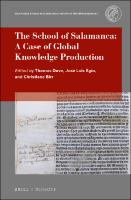The School of Salamanca: A Case of Global Knowledge Production
Contributor(s)
Duve, Thomas (editor)
Luis Egío, José (editor)
Birr, Christiane (editor)
Language
EnglishAbstract
Over the past few decades, a growing number of studies have highlighted the importance of the ‘School of Salamanca’ for the emergence of colonial normative regimes and the formation of a language of normativity on a global scale. According to this influential account, American and Asian actors usually appear as passive recipients of normative knowledge produced in Europe. This book proposes a different perspective and shows, through a knowledge historical approach and several case studies, that the School of Salamanca has to be considered both an epistemic community and a community of practice that cannot be fixed to any individual place. Instead, the School of Salamanca encompassed a variety of different sites and actors throughout the world and thus represents a case of global knowledge production. Readership: All interested in the legal history, the history of knowledge, book history and history of philosophy and theology in early modern times, especially with regard to colonial Ibero-America and Asia.
Keywords
Legal historyDOI
10.1163/9789004449749ISBN
9789004449749, 9789004449732, 9789004449749Publisher
BrillPublisher website
https://brill.com/Publication date and place
2021Imprint
Brill | NijhoffSeries
Max Planck Studies in Global Legal History of the Iberian Worlds, 2Classification
Legal history


 Download
Download Web Shop
Web Shop